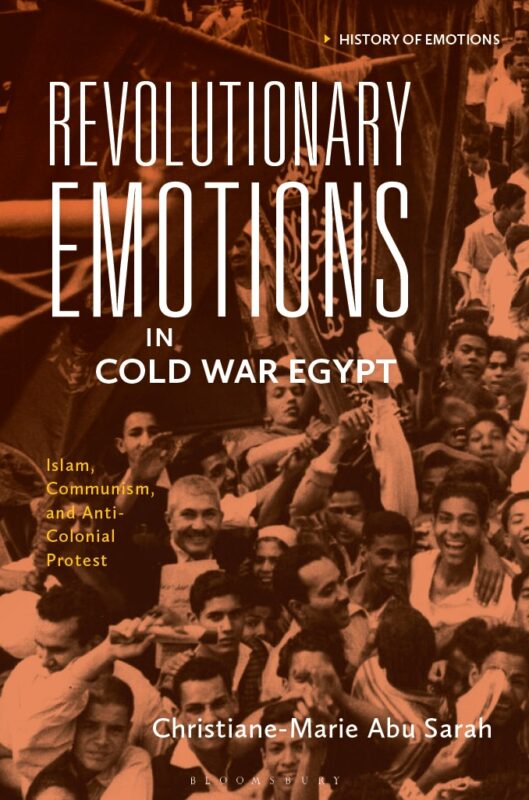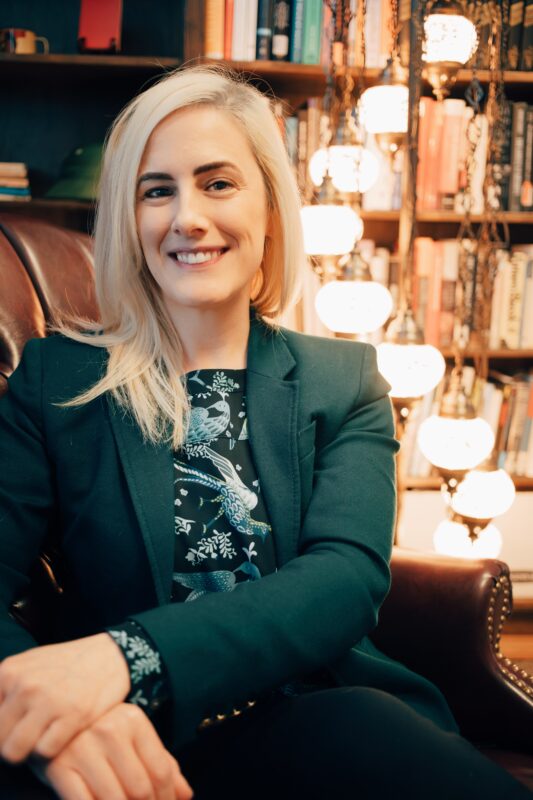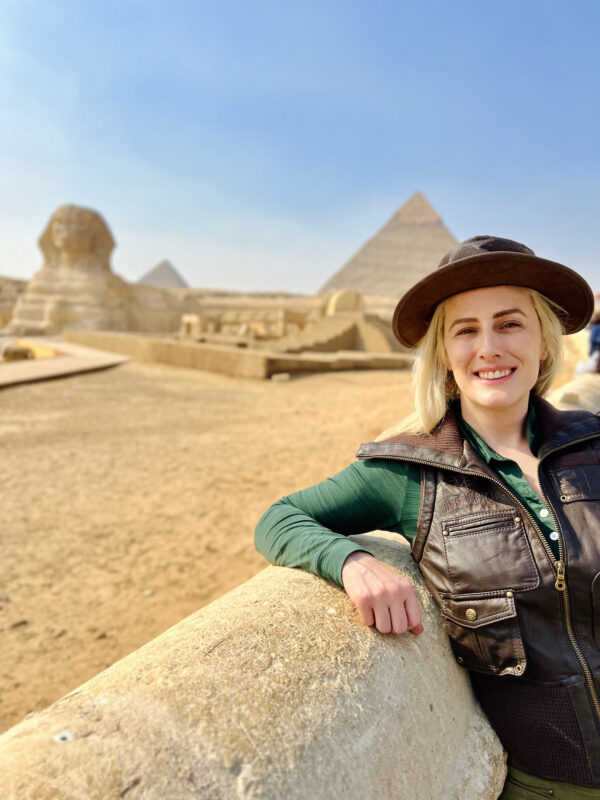
Book by Erskine’s behavioral historian to be released this spring
 Assistant Professor of History Dr. Christiane-Marie Abu Sarah, a member of the Erskine College faculty since 2020, is the author of Revolutionary Emotions in Cold War Egypt: Islam, Communism, and Anti-Colonial Protest, published by Bloomsbury Press and set to be released this spring. A behavioral historian and director of the Center for Behavioral and Cognitive History (BACH), she serves as program director for Erskine’s International Studies major.
Assistant Professor of History Dr. Christiane-Marie Abu Sarah, a member of the Erskine College faculty since 2020, is the author of Revolutionary Emotions in Cold War Egypt: Islam, Communism, and Anti-Colonial Protest, published by Bloomsbury Press and set to be released this spring. A behavioral historian and director of the Center for Behavioral and Cognitive History (BACH), she serves as program director for Erskine’s International Studies major.
A plea for help
Late one night back in 2012—when Christiane-Marie Abu Sarah was working as a research associate with the Center for World Religions, Diplomacy, and Conflict Resolution (CRDC) at George Mason University—she received what she describes as an “emergency call,” and was drawn into an experience that led eventually to writing her book.
The call came from a professor she worked with at CRDC. While making final preparations for taking a class to Cairo, he learned that his co-instructor’s visa had been denied.
“The Muslim Brotherhood and Islamist Bloc had just swept the Egyptian parliamentary elections, and the Arab Spring protests were going strong,” Abu Sarah recalls, explaining the historical context of the professor’s problem.
“In 12 hours, his class was flying out of D.C. into a very sensitive political situation, with no instructor who could speak Arabic and no instructor who had ever visited Egypt before.”
Abu Sarah had lived in the Middle East for several years, had taken student groups to Egypt, and had studied Arabic in graduate school. When the professor “asked if I’d drop everything and help,” she says, “I threw some clothes in a bag and boarded a flight to Cairo.”
Being there
The turbulent environment in Egypt entailed both difficulties and rewards for Abu Sarah and her students.
“I spent a lot of time on that trip trying to keep students from sneaking out to join the demonstrations,” Abu Sarah says, adding, “One student narrowly missed getting tear-gassed because he was trying to take photos.”

On the other hand, she was able to introduce the class to guest speakers from among “Egyptian students who helped topple the Mubarak regime, Islamist activists, [and] protestors who had been tortured for acts of civil disobedience.”
When she made her unexpected journey to Egypt in 2012, Abu Sarah “had just finished studying the Israeli Black Panthers and the Jewish Defense League and was looking for a new project.” Stepping up to assist the professor “landed me in the right place at the right time to start working on Muslim Brotherhood activism.”
Her new area of study started her down a long path to Revolutionary Emotions.
Explaining activism
The chapters of Abu Sarah’s book are based on the journals, manifestos, and courtroom testimonies of Egyptian activists in the 1940s and 1950s, more than 60 years before the young researcher and her students traveled to Egypt during the Arab Spring. This earlier generation of activists fought British rule in Egypt and “eventually toppled the Egyptian monarchy,” she says.
In Revolutionary Emotions, which she describes as a book about “emotions and storytelling in public campaigns,” the author looks at how these activists tried to get others to share their views and considers the darker question of how some of them tried to justify violent acts.
At a recent conference of the American Historical Association, Abu Sarah spoke about a chapter of her book titled “Paul Revere’s Ride through the Suez Canal.”
“It’s a fun chapter about how Egyptians tried to convince the United States to end the British occupation of Egypt by telling stories from American history,” she explains.
“For instance, Egyptians reminded Americans about the Boston Massacre and how George Washington rallied American jihadists to fight British tyranny—yes, Egyptians called the Minutemen mujahidin!” she says, using a word referring to people engaged in jihad.
Although the Egyptians’ efforts at persuasion failed, “overall, the chapter has a lot to say about the emotional politics involved in getting people to share your anger or sympathize,” Abu Sarah says.
 In another chapter of her book, the author focuses on “emotions and moral values,” an aspect of her work addressed in her 2020 TED talk, “How do daily habits lead to political violence?” In this chapter, she follows two students who colluded in the 1948 assassination of the Egyptian prime minister.
In another chapter of her book, the author focuses on “emotions and moral values,” an aspect of her work addressed in her 2020 TED talk, “How do daily habits lead to political violence?” In this chapter, she follows two students who colluded in the 1948 assassination of the Egyptian prime minister.
In her TED talk, Abu Sarah explains that she studies “aggression, moral cognition, and decision-making in social movements,” and her chapter on the student assassins illustrates this.
“The chapter explores their murder trials, which involved these fascinating courtroom debates about the young men’s emotions and moral values,” she says. “To me, a core human question is how we rationalize these kinds of behaviors to ourselves and others—how people can do bad and still feel good.”
Takeaways
As director of the International Studies program at Erskine, Abu Sarah sees a connection between the new Erskine major and the themes of the book. She believes that the book highlights some important skills students need, whatever major they choose.
“It’s great timing that the book is being released right as the International Studies program is launching here on campus, because the book’s core message is about how to communicate with different audiences,” she says. “International Studies is about learning to negotiate with audiences who have different interests, goals, backgrounds—and yes, emotions.”
Asked what students might learn from reading her book, Abu Sarah points out a “practical takeaway,” namely, that “learning to negotiate feelings is an underappreciated job skill.” She adds, “The book’s title—Revolutionary Emotions—refers to the fact that emotions can be a powerful mode of persuasion.”
Regarding her book in light of what today’s students face, she says, “I think a lot of students come to college because they want to change the world or change their situation,” and notes that students struggle with deciding “What major should I study, which groups should I join, where should I go after graduation?”
The Egyptian students in Abu Sarah’s book “wrestled with the same problems,” and lived in a rapidly changing world.
“But the leaders and groups who were successful became experts in people—they figured out how to be flexible and adapt quickly without compromising their core values,” she says. “That’s what the book—and that’s what International Studies—is all about.”
For more about Dr. Christiane-Marie Abu Sarah, see an earlier story here.
